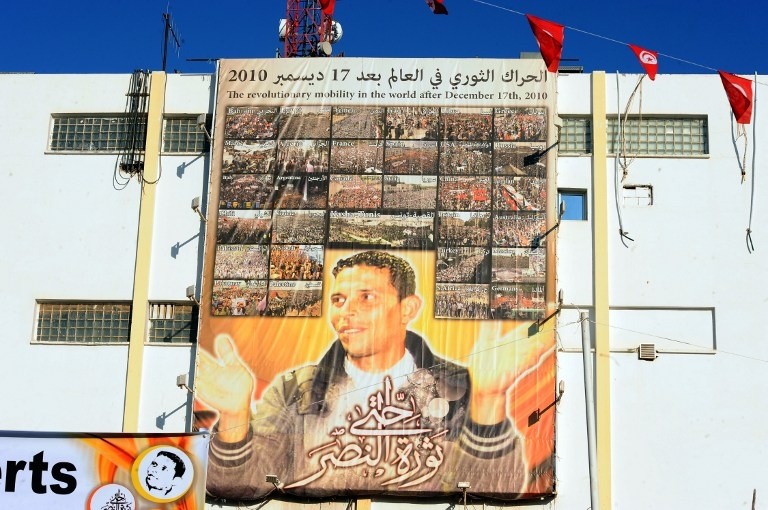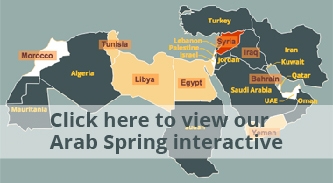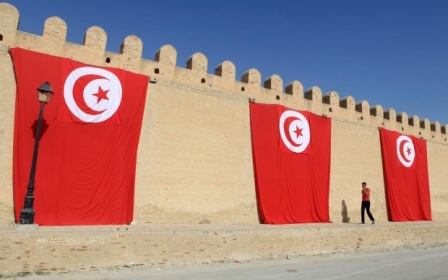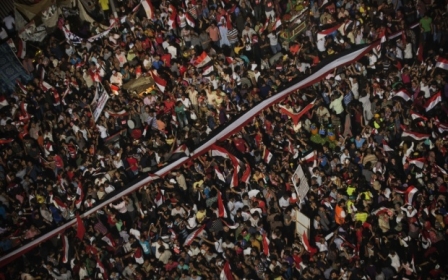The Arab Spring, four years on

Four years ago, today, a young Tunisian vegetable vendor lit himself on fire in protest of life under a dictator supported by the West. He also lit a fire across the region, sparking what became known as the Arab Spring - a grassroots, anti-autocratic movement.
However, the movement’s protagonists lacked a vision of what they wanted to build in place of the toppled dictators. Amidst the euphoria of dramatic political change, manyactors simply sought to purge all vestiges of the former regimes. That strategy has largely failed and the Arab Spring has withered into a bleak Arab Winter.
Syria’s peaceful uprising has morphed into a horrifying, never-ending civil war. In Libya, the state has collapsed while myriad militias and two rival governments scramble for control of the country’s oil resources. Egypt is back where it started - under military dictatorship masquerading as civilian rule. And throughout the region, the political vacuum and ideological polarisation ushered in by the Arab Spring allowed Islamic State to take root.
The primary cause of all this mayhem has been a failure on the part of the successful revolutionaries to integrate reformist elements and skilled technocrats from their old adversaries. Regime transitions require expertise, leadership, and experience.
There is one exception to this depressing political landscape: Tunisia. In October, the country held parliamentary elections that produced a democratic change of government. Next week, Tunisia votes in a landmark runoff, picking their first democratically elected president in history.
By contrast, Tunisia’s eastern neighbor, Libya, is mired in chaos. Militias continue to establish fiefdoms, smuggling networks, and leverage over the county’s weak institutions. Federalist militias allied with the internationally-recognised Tubrok government control most of the Eastern oil fields and terminals. There have been noises about setting up a new national oil company so as to deprive the rival government in Tripoli access to Libya’s oil wealth. In response, a sustained battle for control of the key oil ports has just broken out. Most of the country is outside of the control of either of the rival administrations, and as such, jihadist groups govern large swathes of territory.
Libya’s eastern neighbor, Egypt, is in the throes of a counterrevolution to reestablish an even more repressive version of the ancien regime. General Sisi has chosen to wage a war to the death with the Muslim Brotherhood and Islamists generally—a strategy that has spawned myriad terror groups, such as Ansar Beit al-Maqdis (which recently pledged allegiance to ISIS).
These outcomes were not inevitable. Had Egypt or Libya chosen inclusion over vengeance, their fate may have been quite different.
Tunisia chose to be inclusive. In its first elections after Ben Ali fled, Tunisians resisted the temptation to purge everyone tainted by association with the former dictator. Instead, the ruling Islamist coalition extended an olive branch to elements of the old guard even though they were virulently anti-Islamist. In fact, the front runner in the upcoming presidential runoff has longstanding ties to the toppled dictator, but remains popular because he has cast former allegiances aside in favor of consensus, managerial skill, and pragmatic politics. Ironically, outreach to the vestiges of a collapsed dictatorship saved democracy in Tunisia.
In Libya, powerful militias forced purges of anyone associated with Gaddafi. Although the media misrepresents Libya’s current war as a struggle between Islamist and anti-Islamists, it is primarily a battle between those who support and those who oppose a complete purge of former regime officials.
Egypt might have followed the Tunisian pattern. During the revolution, civil society activists underscored the importance of preserving Egyptian state institutions. Moreover, in Egypt’s first post-revolution presidential election, Mohammed Morsi of the Muslim Brotherhood only narrowly defeated a former Mubarak official. But rather than include old regime technocrats, he put vengeance before reconciliation. Now, the pendulum has swung back and the military has aggressively removed the Brotherhood from power. This vicious cycle makes it possible Egypt could be ripe for another anti-dictatorial uprising in only a few years.
The United States is surprisingly implicated in these ideological battles. Prior to the Arab Spring, America had a checkered record when it came to promoting democracy in the Middle East. While preaching democracy, the US sold billions of dollars’ worth of arms to repressive dictators, including Tunisia’s Ben Ali and Egypt’s Mubarak. So, when the Arab Spring began, President Obama found himself in the uncomfortable position of celebrating attempts at democratisation born in the death throes of regimes the country previously supported.
It would have been pragmatic to advocate for inclusion of reformist old guard figures, but it also would have underscored the United States’ past involvement in propping up the former dictatorships. As a result, the White House did not put significant pressure on Egypt, Libya, or Tunisia to include their skilled former regime technocrats.
Tunisia made the right choice without Western pressure. Libya and Egypt did not.
When dictators fall and democracies rise in the future, the US must aggressively support moderation and pressure new regimes to avoid the tantalising trap of simply taking a wrecking ball to the political structures of fallen dictatorships. Americans should have learned this lesson after their own misadventure in Iraq, with 'De-Ba'athification - the failed policy of completely purging Saddam Hussein's fallen Sunni dominated regime - ending as an unmitigated disaster. That purge, along with disbanding Iraq’s army, were the two main causes for Iraq’s civil war. The ensuing power vacuum allowed IS to emerge.
In these turbulent times in a turbulent region, the West cannot eliminate extremism militarily, but it can foster shining examples of moderation - like Tunisia. Conversely, where state structures are imploding and legitimate governance is lacking, like in Libya, we must not stand idly by, tacitly condoning an armed scramble for the oil. Now is the time for declaring both of Libya's pseudo-governments as illegitimate and refusing to buy their oil until a national unity government shepherds a genuine constitutional transition. In Egypt, we must not let our fear of the growth of extremism and right-wing lobbying allow us to continue blindly supplying the military hardware that President Sisi uses to brutalise his opponents.
Looking back, the trajectory of the Arab Spring offers an enigma to Western policy makers and aspiring democrats: to avoid throwing the baby out with the bath water, even revolutionary movements aiming for democracy must forge alliances with reformist elements of toppled dictatorships. Eventually the Assad regime will fall, and Western policymakers will be presented with an opportunity to demonstrate what they have learned.
- Jason Pack is a researcher of Middle Eastern history at Cambridge University, president of Libya-Analysis.com, and lead author of Libya’s Faustian Bargains: Breaking the Appeasement Cycle - published in May 2014 by the Atlantic Council. Brian Klaas is a Clarendon Scholar and researcher at the University of Oxford. He focuses on democratic transitions, elections, and political violence (particularly coups and civil wars). He has served as an adviser to International Crisis Group and the Carter Center as well as large multinational private sector clients on investing amidst the volatile politics of emerging markets.
The views expressed in this article belong to the author and do not necessarily reflect the editorial policy of Middle East Eye.
Photo credit: A giant portrait of Tunisian protestor Mohamed Bouazizi hangs on the wall in the central town of Sidi Bouzid (AFP)
Middle East Eye propose une couverture et une analyse indépendantes et incomparables du Moyen-Orient, de l’Afrique du Nord et d’autres régions du monde. Pour en savoir plus sur la reprise de ce contenu et les frais qui s’appliquent, veuillez remplir ce formulaire [en anglais]. Pour en savoir plus sur MEE, cliquez ici [en anglais].






